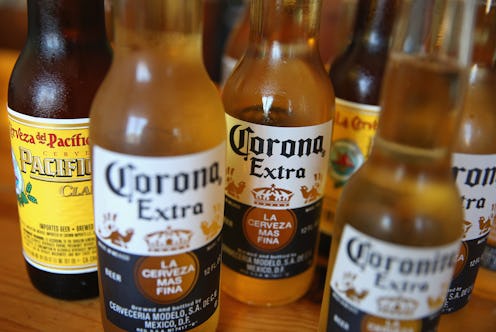News
Wait, What Did You Say Was In Corona Beer?!
The best accompaniment for a cold Corona on a hot day? A slice of lime. The worst? Particles of glass. In the beer. Unfortunately for Constellation Brands, the importer of the Mexican beer, glass contamination is causing Corona Extra beers to be recalled across the country.
According to Constellation's official statement on the Corona website, "a production error occurred" in one of the glass plants that provide bottles for the company. Apparently, this error caused defects in the bottles that make it particularly easy for particles of glass to break off and fall into the beer, so unless the beverages were swaddled with cotton balls before being shipped off to the U.S., it is highly likely that many of these drinks are laced with glass.
Luckily, the company's routine quality control inspection caught the mistake early on, and Corona believes that "less than 1 percent" of the contaminated product is currently in circulation.
According to Business Insider's 2013 map of America's favorite beers by state, California will be the hardest hit by this news, as their residents prefer Corona to any other brand of malted beverage. Interestingly enough, in 2013, California was also reported to be the state that shipped the most beers, with 22.32 million barrels moving around the state.
However, in terms of imbibing, California lags behind other states in the union, ranking 44 with an average beer consumption of 25.5 gallons per year. The national average is significantly higher at 28.2 gallons per year.
While California's surrounding states prefer Blue Moon, Corona remains a popular choice. As Constellation's CEO Rob Sands told CNN Money, Corona is the best selling imported beer in America. It is, after all, the only beer on Business Insider's map that is not American. Corona also ranks fifth overall in terms of beer popularity in the U.S. Earlier this year, Corona posted excellent numbers in their first quarter's results, accounting for nearly half of Constellation's $1.3 billion in sales.
This little setback affects single, six, 12, and 18-packs of Corona Extra, although no other varities of the beer are involved in the glass debacle. Bill Hackett, President of Constellation Brands Beer Division, assured his customers in a statement that the company is "working proactively . . . to resolve this situation as quickly as possible."
Said Hackett:
Throughout its history, Corona Extra is a brand that has been synonymous with quality, consistency and refreshment. Our entire organization...is absolutely committed to doing everything possible to complete this recall quickly, and ensure the safety of our consumers and integrity of our product.
Of course, this is not the first time that a beer company has had to issue a recall. In fact, in 2008, Sam Adams, the beer of choice for most of New England (and randomly, Illinois), had to recall its beverages for the exact same problem — containing "small grains or bits of glass." The reason behind the issue was also identical — they cited production issues in "a third-party glass bottle supplier that might cause small bits of glass to break off and possibly fall into the bottle."
Apparently, this is the most common problem cited for beer recalls, as Heineken suffered the same problem two years ago with Dos Equis. Forty-three states received six- and 12-packs of the beer whose bottles had the "potential for small grains or particles of glass to separate from the inside lip of the bottle and fall into the liquid."
One of the only recent instances of a beer company issuing a recall for a reason other than glass particles in the bottle came in 2009, with Coors Light, which determined that one batch of beer tasted "subpar" to Coors standards. Spokesperson Pete Marino told the Chicago Tribune, "We sampled it and realized it wasn't up to standards." Not the most scientific reason, but certainly an admirable one.
As minute as the glass issue may seem, ingesting glass particles can be extremely dangerous, according to the Food and Drug Administration. Swallowing bits of glass may cause "damage to teeth, laceration of the mouth and throat, or perforation of the intestine," none of which are desirable side effects of a beer.
The hazard of glass is so dangerous that the FDA actually recommends production companies to monitor their operations at the beginning of the day, every four hours during the day, and then at the end of the day to ensure that there is no glass contamination.
In 2013, Fay Wesley, a British businesswoman, died after swallowing an "inch long" piece of glass from a jar of mustard, which contained another 29 slivers of glass. While it is unlikely that any of the potential pieces of glass in the Corona bottles would be this large, the dangers associated with glass are not to be taken lightly.
So be warned — if your bottles of Corona have these production codes, take it back to the store for a full refund, and grab another, non-glass-filled beer to enjoy.
Getty Images (5)
